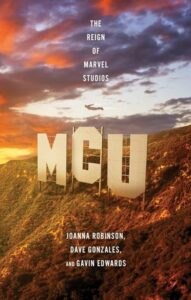The Marvel Cinematic Universe has essentially ruled popular culture for the past 15 years, through a seemingly endless series of interconnected movies. Now, we finally have the definitive book about the phenomenon, how it happened, and what it means.
The book is MCU: The Reign of Marvel Studios, released last fall and authored by Joanna Robinson, Dave Gonzales, and Gavin Edwards. The book goes into the behind-the-scenes of the series of risky business deals that made the MCU possible, and also about the production stories of the individual films.
For a long time, MCU movies looked like a sure thing, although that’s become less of the case recently. But around the turn of the millennium, it was far from clear that audience demand existed for superhero movies not starring the biggest ones (Batman, Superman, and Spider-man).

Marvel Entertainment, as of the early aughts, was a comic book publisher that lived and died by the success of its toy tie-ins. When it decided to launch a movie studio, it required a loan from Merrill Lynch, a mortgaging of several of its major characters, and the very real chance that the entire venture would fail.
But then, of course, the original Iron Man was a huge hit in 2008, Disney stepped in to buy Marvel and roll out the Avengers and larger MCU, and the Marvel movie operation was never in a precarious financial position ever again.
Throughout, it’s clear, if it wasn’t already, that Marvel Studios boss Kevin Feige is the auteur of the Marvel movies, and his vision takes more of a precedence than those of any individual director of the movies, whether they’re prestige veterans like Kenneth Branagh, blockbuster types like Jon Favreau, or the enigma that was Joss Whedon.
Spilling the Tea
None of the movie stars who have played Marvel superheroes come across as jerky or unprofessional, with the singular exception of Edward Norton, who ran roughshod over the early Incredible Hulk movie, leading to his replacement as the Hulk for the rest of the series with Mark Ruffalo.
There is a bit of tea spilled in regards to various departures, as well as things like Scarlett Johansson’s lawsuit against Disney and Favreau and Whedon’s stepping away. The story is told about how the MCU had to scramble, with plans for Black Panther 2, following the sudden death of Chadwick Boseman in 2020, and the machinations that led to Spider-man becoming part of the SVU (then Sony studio boss Amy Pascal, we learn, threw a sandwich at Feige when he first suggested it).
MCU’s Real Villain
But there’s no question that the main villain of the piece is Ike Perlmutter, the longtime head of Marvel Entertainment, who is depicted as a cheapskate, a Trump intimate, and also an inveterate sexist and racist. Perlmutter, the book makes clear, long made decisions singularly based on what would sell the most toys, and believed, to the point of near-obsession, that nobody wanted to see female superheroes, and certainly no one wanted to buy action figures of them.
So, it turns out that the troglodytes on message boards who whine about “The M-she-U” and “Marvel going woke” had views remarkably similar to the man who led Marvel Entertainment for many years, and expressed some autonomy as part of the “Creative Committee” as recently as 2015.
There are hints, near the end of the book, that things are starting to decline, with the saturation of Disney+ shows that feel like homework, as well as recent movies that have been less than great. And then Marvel had to upend years of plans once again, following the arrest and conviction of Jonathan Majors.
I almost wish the book were coming out a year later, to express that decline in further detail. And I would very much love to read a book — possibly by the same authors — detailing Disney’s purchase and stewardship of Star Wars, and all the drama that has entailed since Disney bought Lucasfilm in 2012.
MCU: The Reign of Marvel Studios could have been a fanboy celebration of the MCU’s history, in line with the sort of self-mythology that Disney loves so much. But luckily, it’s much better than that.




